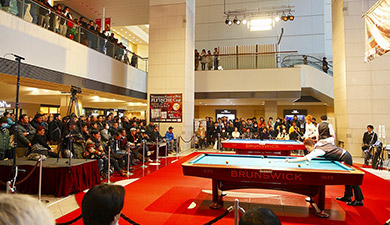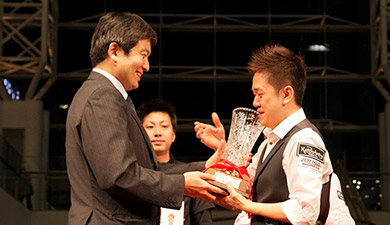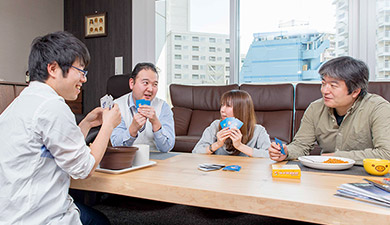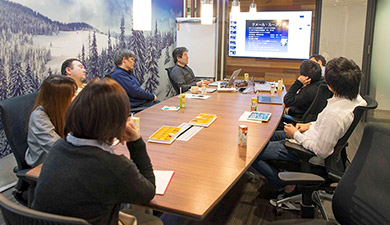Founder Interview
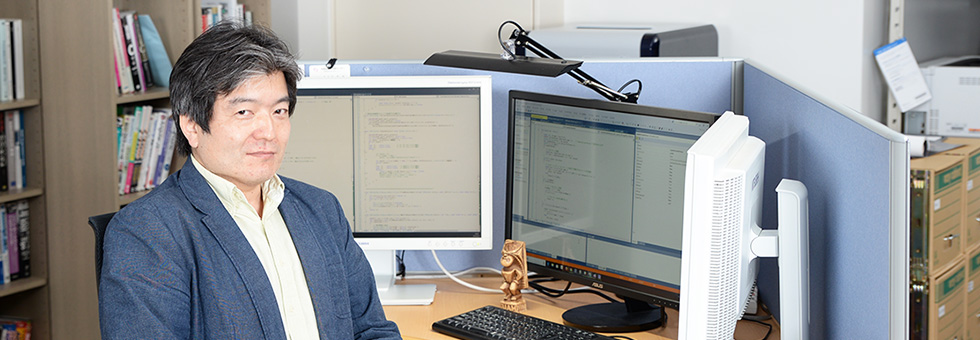
Founder of FLEXSCHE Corporation (First Representative)
Mikio UranoMikio Urano
*The text is published as it was when Urano was the representative director.
Founder of FLEXSCHE Corporation, and since thenRepresentative Mikio Urano has continued to develop 'FLEXSCHE' for over years. What are his views on the company and work, having focused solely on developing production schedulers and nurturing the company and products to this point? We asked about the past and his vision for the future of FLEXSCHE Corporation.
"I won't get up for free even if I fall"
Please tell us about your motivation for starting FLEXSCHE Corporation.
In my previous job, I worked as an engineer at a package software manufacturer developing production schedulers. By gaining development experience there, I became confident that I could create the best production scheduler in the world. I naturally had the mindset that "my work" is something I decide and tackle myself, so in 2001, at the age of 33, I started my own business to develop a superior new production scheduler by leveraging my experience.
Did the transition from leaving your job to starting the company go smoothly?
No, there was intense resistance from my previous company, so it didn't go smoothly. However, I persevered and managed to reach a settlement under certain conditions. The condition was that their company would become one of our product's distributors in exchange for accepting a clause that "we must not create package software for two years."
Does that mean you couldn't create a production scheduler even though you founded the company for that purpose?
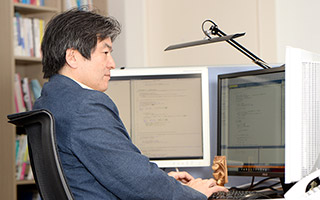
That's not necessarily the case. The 'FLEXSCHE Components' created under those conditions is not a package software but a "set of components for building a production scheduling system," and it is an extremely flexible development platform. Three years later, we released the package software 'FLEXSCHE Maestro' (now 'FLEXSCHE GP'), which inherited the flexibility of 'FLEXSCHE Components.' Thanks to this background, we were able to establish the important concept of "having high flexibility while being package software." Moreover, the contract fee income during the early days of low-altitude flight, when we were barely getting by with commissioned development, was very helpful in the end. It is no exaggeration to say that the current FLEXSCHE and FLEXSCHE Corporation exist thanks to the ups and downs of that time.
The obstacles that stood in your way at the start of the business ended up producing good results, didn't they?
Yes, indeed. "Even if I fall, I won't get up for free" is my motto (laughs).
What kind of work were you doing before that? Could you tell us about your background?
I studied computer software during my university days, and after graduating from graduate school in 1993, I started a business with three friends. However, it was such a crude business that we didn't even know what kind of company it was, and we ended up dissolving it in a year. After that, I changed jobs to a company I found in a job magazine, but I couldn't do creative development there, and I felt it didn't contribute to my growth as an engineer, so I quit in less than half a year. The next company I happened to join was a manufacturer of production schedulers.
Your major in university was also computer software, but have you always been interested in this field?
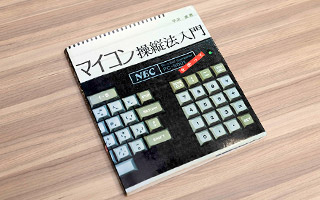
As a child, I was what you might call a "microcomputer kid." I became interested in it around the second year of junior high school. Microcomputers were expensive, so ordinary households didn't have them, and of course, neither did my poor family. So, I studied by reading books thoroughly and writing programs with a pencil on paper. It was a time when people without microcomputers were called "No-computer tribe." I read the book 'Introduction to Microcomputer Operation' (published by Radio Technology Company) so many times that it almost had holes in it.
So, that book is where your roots lie, Mr. Urano.
Yes. It's a good book that explains hardware and software in a balanced way. Recently, I got it again as a second-hand book. There was a time when I practiced typing on the cover of this book instead of a keyboard (laughs). Then, I begged my parents and got a 'PC-8801' as a high school entrance gift, and I spent my high school days tinkering with it endlessly. Speaking of those days, there was a monthly magazine called 'I/O' (published by Kogakusha) that featuredhexadecimal dump lists of game programswhich I would spend hours, sometimes over ten hours, inputting. I would "record" the inputted program onto a cassette tape, load it into the computer, and play it. I was completely absorbed in programming and gaming on the computer every day. I also learned machine language around this time.
And you studied computer software at university as well.
I didn't intend to make it my job, but I majored in information science because I was good at it and it seemed interesting. However, I wasn't a very serious student. I was so absorbed in part-time jobs that I ended up repeating a year.
What kind of part-time job did you have?
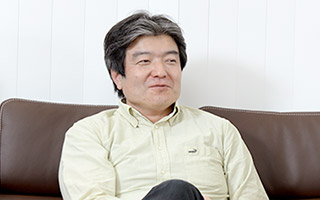
I worked at a game software house. Initially, I went there after classes, but I gradually got more involved, and before I knew it, I was spending all my time there, even though I thought I should attend classes. I slept wrapped in a blanket under the desk, and there was a time when I even lived in an apartment rented by the company. It was the only time in my life that I experienced a "death march" workplace, where I worked frantically to meet deadlines, and as soon as one game was finished, the development of the next one started (laughs). Even so, at that time, I had a perverse desire to continue that lifestyle, but in the end, I decided to return to university just a week before the deadline, which would have forced me to drop out if I missed it.
Were you involved in game production there?
I was programming. The knowledge and experience I gained there are greatly utilized in my current development. For example, Gantt charts contain a lot of the essence of game programming, and the experience of coding intensively in assembly language has been very useful in developing FLEXSCHE with C++ language, which pursues maximum speed.
As expected, you don't get up for free even if you fall (laughs).
Exactly!
The origin is the middle school art assignment that shone brighter the more it was polished.
Why did you choose the field of production schedulers among software, and why have you continued to develop it?
Rather than choosing it, the company I was invited to join happened to be making it, which is the only reason I started developing production schedulers. I continue to develop it because it is the area where I can best utilize the vast amount of know-how, knowledge, and my abilities that I have accumulated and built up while working on that job. I originally had no knowledge of the manufacturing industry, but I feel a sense of sympathy for the aspect of thoroughly pursuing manufacturing.
Have you always liked "making things" since you were a child?

Yes, I believe the origin of my passion for making things was a middle school art assignment in the second year. It involved carving a stamp out of stone, but I couldn't finish it during class time, so I had to take it home as homework. Without any particular purpose, I polished it with a handkerchief for a while, and it became a bit smoother. I wondered what would happen if I continued, and after about three days of polishing at home, it became incredibly shiny. My teacher was surprised when I submitted it. I vividly remember feeling that "if you keep polishing one thing, it can shine so brightly." Well, I guess it's what you call a "middle school syndrome" (laughs). Nevertheless, now, Ibelieve that the reason I can continue making FLEXSCHE for years is thanks to that stamp incident.
It's because of your passion for making things that you continue to work as an engineer while also handling management tasks, isn't it?
My essence lies in software development. However, recently, I've been so busy with the renewal work of this website that I haven't had any time to write code. I want to get back to it soon. By the time everyone reads this, I should be able to resume coding.
Thank you for your hard work. How often are you in the office?
I'm not working long hours. Like the other employees, I come to work on time and leave at a reasonable hour. Since the founding, there hasn't been a time when I worked overnight. I work in a balanced way so that I can spend time with my family, and I completely rest on weekends.
How do you spend your days off?
I spend time with my family, indulge in hobbies, just the usual things.
What hobbies do you have?
I enjoy watching movies. I rarely go to the cinema and mostly watch at home, but I've probably watched thousands of hours across various genres. Recently, I've been practicing the piano during lunch breaks at the office... and I also play billiards occasionally.
How long have you been playing billiards?
It's been about 10 years. Despite that, I haven't improved much and have been stuck at the B-level (intermediate level) forever. I was pessimistically resigning myself to the fact that I might never reach the A-level in my lifetime. However, recently,I unexpectedly won the B-level official tournament,so I was inevitably promoted to the A-level. Yay!
Congratulations (laughs). In the past, you were the title sponsor of a professional billiards tournament called the 'FLEXSCHE Cup.' That's when I, as an editor of a billiards magazine, first met you during the coverage.
We held it at the large commercial facility 'Queen's Square Yokohama' in Minato Mirai in 2013 and 2015. It was a very grand and wonderful event. I would like to hold it again, but for some reason, the organizers haven't been calling for the next event, which is a bit lonely (smiles wryly).
In relation to that tournament, you published a manifesto titled'Suggestions for Professional Billiards Players'aimed at the billiards industry. I felt that various aspects of your values were reflected in it. What do you think?
Indeed, it expresses my way of thinking quite a bit. I believe that whether you're a billiards player, an engineer, or a company, if you claim to be a "professional," the significance of your work lies in creating as much value as possible, and creating an environment necessary for doing good work is also part of the job. I heard a lot of voices of empathy for this statement, but unfortunately, it didn't lead to any concrete actions. As expected, some people disliked it, but that's unavoidable (smiles wryly).
What does the word "value" mean in a more understandable way in this context?
Of course, the word "value" is not a synonym for money. In the first place, "earning money" and "creating value" are completely different things for me. Value actually comes in various forms, but broadly speaking, it's about making people happy or bringing them some joy. For example, no matter how much you earn from day trading stocks, it doesn't create any value, and I don't recognize even a shred of professionalism in such "zero-sum business."
'FLEXSCHE Corporation is like a music band.'
From your perspective, what kind of company is FLEXSCHE Corporation?
I think of this company as something like a music band. Not a big band, but a small band with a guitarist, a bassist, and maybe a manager. Each employee has an important and different role, and by fulfilling those roles, they create music. That's the kind of company it is. Everyone has different strengths, so they work hard in their respective parts, and it all comes together. Even if there were nine of me, I could never have created the current company. The training and manuals would probably be a mess, and sales even more so (laughs).

What does it mean to be a small group?
The development of a production scheduler is a very deep field despite its narrow scope, and it can only be achieved by a small group of members consolidating their know-how. If it were software completed by simply piling up simple tasks, just adding more people might bring it closer to completion. However, in the case of FLEXSCHE, increasing the number of people does not improve development efficiency, and there is a "specialty" in the approach to development that differs from general software. Therefore, a small, elite team is advantageous to ensure product quality. Even when looking at the company as a whole, the larger it gets, the more difficult it becomes to operate, and selling to maintain the company might become the goal. So, I think it's better to continue the business compactly without increasing the number of people too much. As a company manager, it might be considered a lazy way of thinking.
What is the specialty in the development of FLEXSCHE?
It is due to the style of building on the extension of a single code writtenyears ago. Many software products would quickly collapse and be forced to completely renew if they continued to update in this style. We have carefully nurtured a single piece of software over time. To do this, we must add new features that meet needs without compromising compatibility, and not just add them simply, but build them in a way that doesn't become patchy and continue to evolve normally. For this reason, the engineers must be above a certain level, and conversely, having many engineers makes it difficult to maintain that level.
Are there any other fields close to this way of working?
Hmm, "parenting" might be close. Having 100 parents wouldn't help, right? A few parents focus on taking care of their health to avoid getting sick, teaching what should be taught, and not teaching what shouldn't be taught. But at the same time, not being overprotective, perhaps.
How is the decision made on what should and shouldn't be taught, in other words, the content to be added as a function?

It often starts with user needs. However, if we add functions recklessly based on needs, it will quickly become patchy. Therefore, we must extract the essence of the issues hidden behind individual needs, refine it, and incorporate it into a system that will be useful in various future situations, while also being careful not to hinder future function expansion. This is the difficulty unique to long-lived package software development, but it's also the thrill. We decide these things through discussions with everyone. When three people gather, wisdom emerges, and we come up with ideas that one person could never think of. There are often heated debates, but by clashing opinions and understanding each other's true intentions, we find the real answer. It's like a session where each person brings their sound and it all comes together.
Of course, you are present at those discussions, right? Do your subordinates find it difficult to talk?
No, not at all. On the contrary, it's not uncommon for me to be completely ignored by everyone. Of course, I want them to speak their minds freely, but I often feel like giving up (laughs).
I see. That's why you can create better products.
Since the development of a production scheduler has this nature, a good product cannot be made based on one person's judgment alone. It's easy for me to say, "Just do it quietly," but doing so would likely mean discarding something significant. I value taking the time to carefully consider even minority opinions.
Software development that brings joy to the manufacturing industry and people around the world
Since the founding of the company, has there ever been a time when the company faced a crisis?
After the Lehman Shock, sales did drop significantly, but for some reason, I don't remember feeling a sense of crisis, and fortunately, we didn't fall into the red. The only time we recorded a loss in the company's history was the first year, with just 3,128 yen. I regret that if we hadn't bought that printer ink, we could have said we've been in the black since the founding (laughs).
You've been able to continue your business stably.
It is thanks to the support of our users and partners, and the hard work of all our employees. Our job is to make users, employees, and various people happy through FLEXSCHE and to create value for society. Therefore, the company's financial situation is important, and if we continue to be in a tight situation where management is struggling with cash flow, we cannot do good work. Securing stable sales is ultimately to create an environment where employees can work with peace of mind and do good work. I also consider creating that environment itself to be an important part of my job.
Good work can only be done in a good environment. I agree. Is that why you created the current comfortable office environment?
That's right. We aim to create an environment where all employees feel happy working at FLEXSCHE Corporation. Good product creation should follow from that.
So far, you've only been making production schedulers, but have you ever thought about releasing other software products or starting a different business?
Indeed, there have been discussions within the company about wanting to create completely different products. However, nothing specific has come up that we want to create, and we haven't made anything yet. No one expects us to work in fields without synergy with FLEXSCHE, and we want to focus on what only we can do for the time being, leaving what others can do to other companies.
Are there any challenges that FLEXSCHE Corporation is currently facing?
Recruitment. That's the main issue. I feel that we don't have enough staff to execute what is being demanded. While we do want to increase the number of engineers a bit, we especially want people to join us in sales and marketing. Our company responds to inquiries and requests from partners with a sales style, but we are completely lacking the power to meet those demands, so strengthening our sales force is an urgent task.
How many more people do you plan to hire?
Physically, we have a maximum of 14 seats, so there are 5 vacancies left. I must say, it's quite a good workplace in many ways, so it's first come, first served (laughs). The hurdle is slightly high, though.
Please tell us about the future prospects and goals of FLEXSCHE Corporation.
For me, this is surprisingly a difficult question. We are not aiming to make the company larger or to achieve a lot of sales. If anything, it is to "increase the value we create." There is no doubt that our focus is on production schedulers, but FLEXSCHE Corporation in the future will also be able to utilize the technology cultivated through FLEXSCHE development in different areas. Continuously developing products that contribute to the manufacturing industry by further pursuing the ideal form of production schedulers is what we should aim for, and at the same time, it expands the possibilities of FLEXSCHE Corporation in the future.
Pursuing the ideal of a production scheduler. How far have you come to the final destination?
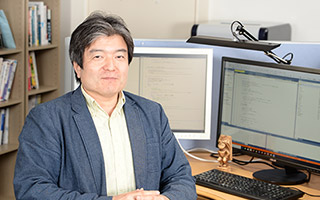
To be honest, I have no idea (laughs). Even though FLEXSCHE can do so much more now, the needs keep emerging. Manufacturing in the industry is evolving, and we must evolve daily in the same way. There are still parts that are lacking in the current situation, and there will be more to do in the future. I believe it is necessary to incorporate new technologies such as AI. We are probably the only ones in a position to devote that much energy to the development of production schedulers, and I believe it is our mission. We want to continue to provide value to the manufacturing industry and people around the world, and to develop software that makes everyone happy.
